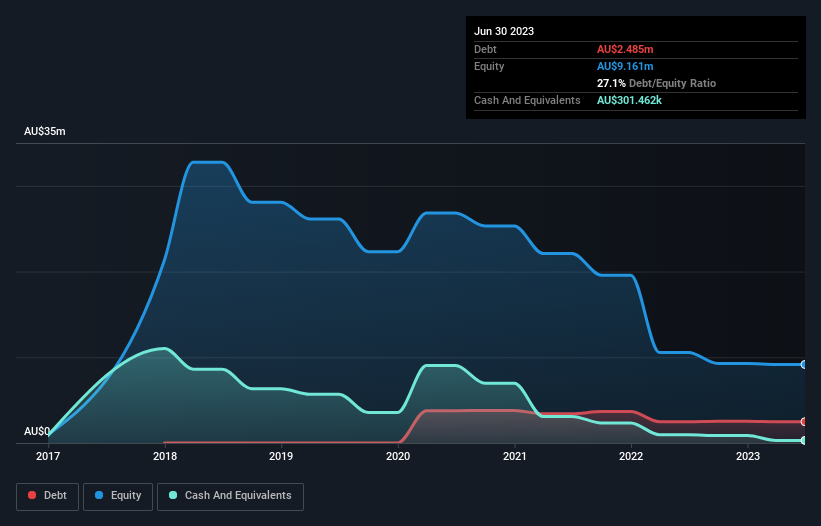Does Epsilon Healthcare (ASX:EPN) Have A Healthy Balance Sheet?

Legendary fund manager Li Lu (who Charlie Munger backed) once said, 'The biggest investment risk is not the volatility of prices, but whether you will suffer a permanent loss of capital.' It's only natural to consider a company's balance sheet when you examine how risky it is, since debt is often involved when a business collapses. We can see that Epsilon Healthcare Limited (ASX:EPN) does use debt in its business. But the real question is whether this debt is making the company risky.
Why Does Debt Bring Risk?
Generally speaking, debt only becomes a real problem when a company can't easily pay it off, either by raising capital or with its own cash flow. In the worst case scenario, a company can go bankrupt if it cannot pay its creditors. While that is not too common, we often do see indebted companies permanently diluting shareholders because lenders force them to raise capital at a distressed price. Of course, debt can be an important tool in businesses, particularly capital heavy businesses. When we think about a company's use of debt, we first look at cash and debt together.
View our latest analysis for Epsilon Healthcare
What Is Epsilon Healthcare's Debt?
The chart below, which you can click on for greater detail, shows that Epsilon Healthcare had AU$2.49m in debt in June 2023; about the same as the year before. However, it also had AU$301.5k in cash, and so its net debt is AU$2.18m.

A Look At Epsilon Healthcare's Liabilities
We can see from the most recent balance sheet that Epsilon Healthcare had liabilities of AU$5.71m falling due within a year, and liabilities of AU$2.94m due beyond that. Offsetting this, it had AU$301.5k in cash and AU$2.57m in receivables that were due within 12 months. So it has liabilities totalling AU$5.78m more than its cash and near-term receivables, combined.
This deficit is considerable relative to its market capitalization of AU$9.01m, so it does suggest shareholders should keep an eye on Epsilon Healthcare's use of debt. This suggests shareholders would be heavily diluted if the company needed to shore up its balance sheet in a hurry. The balance sheet is clearly the area to focus on when you are analysing debt. But it is Epsilon Healthcare's earnings that will influence how the balance sheet holds up in the future. So when considering debt, it's definitely worth looking at the earnings trend. Click here for an interactive snapshot.
In the last year Epsilon Healthcare wasn't profitable at an EBIT level, but managed to grow its revenue by 32%, to AU$7.2m. Shareholders probably have their fingers crossed that it can grow its way to profits.
Caveat Emptor
Despite the top line growth, Epsilon Healthcare still had an earnings before interest and tax (EBIT) loss over the last year. Its EBIT loss was a whopping AU$5.8m. When we look at that and recall the liabilities on its balance sheet, relative to cash, it seems unwise to us for the company to have any debt. So we think its balance sheet is a little strained, though not beyond repair. However, it doesn't help that it burned through AU$2.7m of cash over the last year. So in short it's a really risky stock. The balance sheet is clearly the area to focus on when you are analysing debt. However, not all investment risk resides within the balance sheet - far from it. To that end, you should learn about the 5 warning signs we've spotted with Epsilon Healthcare (including 4 which can't be ignored) .
At the end of the day, it's often better to focus on companies that are free from net debt. You can access our special list of such companies (all with a track record of profit growth). It's free.
Valuation is complex, but we're here to simplify it.
Discover if Epsilon Healthcare might be undervalued or overvalued with our detailed analysis, featuring fair value estimates, potential risks, dividends, insider trades, and its financial condition.
Access Free AnalysisHave feedback on this article? Concerned about the content? Get in touch with us directly. Alternatively, email editorial-team (at) simplywallst.com.
This article by Simply Wall St is general in nature. We provide commentary based on historical data and analyst forecasts only using an unbiased methodology and our articles are not intended to be financial advice. It does not constitute a recommendation to buy or sell any stock, and does not take account of your objectives, or your financial situation. We aim to bring you long-term focused analysis driven by fundamental data. Note that our analysis may not factor in the latest price-sensitive company announcements or qualitative material. Simply Wall St has no position in any stocks mentioned.
About ASX:EPN
Epsilon Healthcare
Epsilon Healthcare Limited operates as a healthcare and pharmaceuticals company primarily in Australia and Canada.
Medium and slightly overvalued.
Market Insights
Community Narratives





